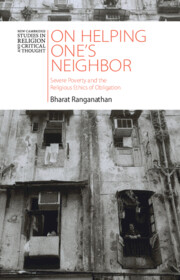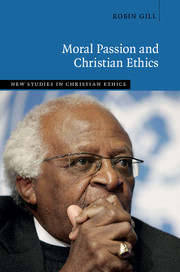On Helping One's Neighbor
Exploring what he calls 'the moral horror that is severe poverty,' Bharat Ranganathan develops a demanding account of the obligations that affluent people have to assist severely impoverished people. He argues that this is an immediate ethical as much as a social or structural imperative. Noting that developmental economists and moral and political philosophers have focused on wealth inequalities in increasingly sophisticated ways, Ranganathan observes that – within religious ethics – normative issues around severe poverty have nevertheless received insufficient attention. Bringing together general moral, religious, and philosophical principles with particular economic, social, and political realities, and engaging constructively with the writings of John Rawls and Peter Singer, this passionately argued book boldly challenges deleterious trends within ethics by unpacking, in a much more systematic way than hitherto, the pressing dilemmas around acute impoverishment. It will find an eager readership among scholars of religion, ethics, developmental studies, and theology.
- Addresses with great sophistication and brio a crucial moral, political, and religious issue that will only become more significant and acute in the coming years and decades
- The first book in religious ethics to bring such a sustained and systematic focus to bear on affluent people's obligations to assist severely impoverished people
- Will have considerable appeal to those not just in religious ethics but also in moral and political philosophy and development studies
Reviews & endorsements
‘The topic is often raised by religious ethicists but has rarely been treated with this amount of depth or focus. Bharat Ranganathan has produced an outstanding book on the subject, one of great importance that will provoke further conversations on the moral obligations of the affluent to those living in extreme poverty.' Nichole M. Flores, Associate Professor of Religious Studies, University of Virginia
‘Bharat Ranganathan's well-written and carefully argued book is the most sustained discussion yet published of the pressing topic of severe poverty which draws on religious ethics. It represents an important (though increasingly less prominent) tradition of joining Christian ethics and religious philosophy.' Eric S. Gregory, Professor of Religion, Princeton University
‘… scholars of religion, ethics, theology, and philosophy will likely have an appreciation for this book … Recommended.’ C. L. Hansen, CHOICE
Product details
March 2024Hardback
9781009428217
232 pages
222 × 146 × 19 mm
0.43kg
Available
Table of Contents
- Preface
- Acknowledgments
- Abbreviations 1. Religious Ethics and Obligations to Others
- 2. Universalism and Relativism, Minimalism and Maximalism
- 3. Institutions, Severe Poverty, and the Obligations of Affluence
- 4. On Helping One's Neighbor
- 5. Moral Demandingness and Obligations to Special Relations and Self
- Conclusion
- Coda
- Appendix I. The Relationship among Basic, Human, and Moral Rights
- Appendix II. Dignity, Indeterminateness of Sense, and Human Rights
- Bibliography
- Index.




